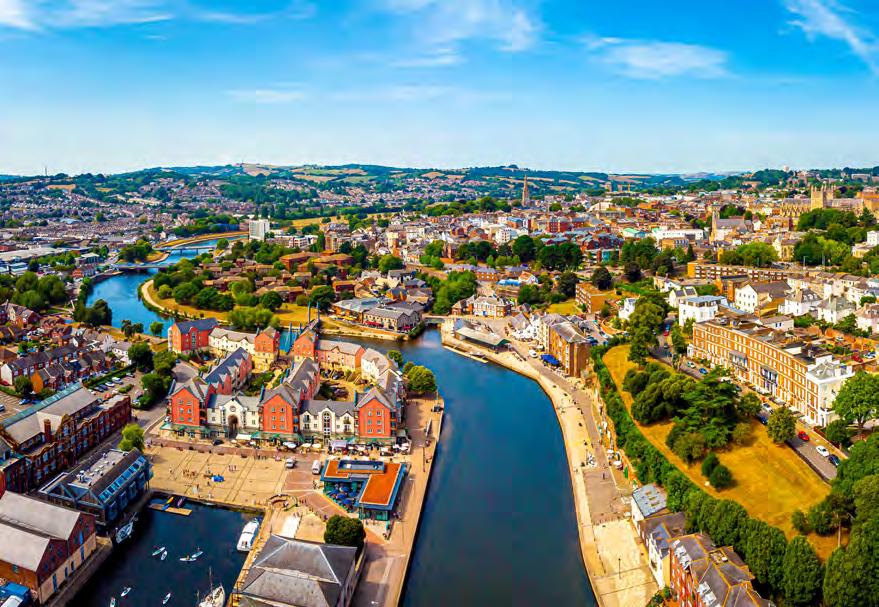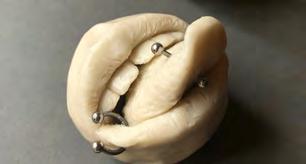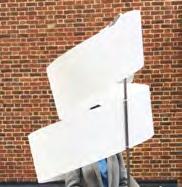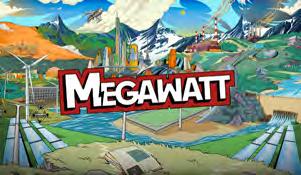Event Guide 2023
Celebrate the people, stories and ideas at the heart of science
All events are free

Celebrate the people, stories and ideas at the heart of science
All events are free

Between 7–10 September 2023, the iconic annual British Science Festival will be coming to the city, in partnership with the University of Exeter.
Join us to celebrate the people, stories and ideas at the heart of science with over 70 unmissable free events at the University’s Streatham Campus and venues across the city, including Exeter Cathedral, Exeter Phoenix and the Guildhall Shopping Centre.
We’ve got something for everyone! Dive into mindbending virtual reality experiences, combat a killer fungus outbreak and try your hand at sustainable fashion.
Explore the art of magic, create artworks inspired by climate change and discover the psychology behind the weather forecast.
The Festival is aimed at visitors aged 16+ and there’s no need for any knowledge of science to join in the celebrations.
Head to the British Science Festival website for more details about the events listed in this guide and to book your free tickets.
britishsciencefestival.org/ events
See you there!
Welcome to the British Science Festival 2023. We are looking forward to a fantastic four days in Exeter; bringing the people, stories and ideas at the heart of science to life across the city and on the University of Exeter’s Streatham Campus.
The British Science Festival is all about making scientific research and innovation relevant and accessible to everyone. It is a chance to shine a spotlight on cutting-edge technologies, new ideas and exciting possibilities. At the same time, we believe that involving more people in science improves the outcomes; more viewpoints, creativity, ideas and contexts make for better results.
With that in mind, we have designed our programme to enable more conversation, more discussion, and more connections. We want you to get hands-on, get stuck-in and have your say.
James Brown Director British Science Festival
The Festival’s talks, workshops, interactive activities and drop-in experiences span topics from across the scientific spectrum, with a particular focus on exploring the areas where science meets society. That focus chimes really well with our partner, the University of Exeter, which has put education, research and partnerships at the heart of its ten-year strategy to create a sustainable, healthy and socially just future.
I’m especially looking forward to welcoming wildlife cameraman, presenter and ‘Strictly champion’ Hamza Yassin; the BBC Studios Natural History Unit who will be demonstrating some of their innovative kit; the British Science Association’s incoming President, Professor Dame Jane Francis, who is Director of the British Antarctic Survey; and climate justice campaigner Mya-Rose Craig. We will be offering Festival-goers the chance to connect with the issue of climate science, circular economies and nature through partnerships with the Met Office and Exeter Science Centre, as well as working with the Natural History Museum, who are bringing part of their blockbuster exhibition, Our Broken Planet – its first appearance since closing at the museum in London.
Other firsts include Exeter Cathedral playing host to Exeter’s first ever ‘science market’ – where there will be opportunities to explore with interactive exhibits, participate in workshops and explore cutting-edge science through art, poetry and song –and the Guildhall Shopping Centre’s first ‘Late’; a special Festival nighttime takeover, featuring performances and virtual reality experiences.
I hope you will enjoy exploring the programme as much as we have enjoyed creating it.
Thank you to our partners and hosts, the University of Exeter, and to all our Festival partners including the Natural Environment Research Council (NERC), the Met Office, Exeter Science Park and Exeter Science Centre – we could not have delivered this event without your support.
We have designed our programme to enable more conversation, more discussion, and more connections. We want you to get hands-on, get stuckin and have your say.
We are truly honoured and delighted that the University of Exeter is hosting the British Science Festival this September, in and around our wonderful city.
The Festival provides a fantastic opportunity to bring people of all ages and backgrounds together to experience the fascinating worlds of science, technology and innovation, and offers inspiration and new insights into some of the ground-breaking work that takes place both here at Exeter and across the UK.
This year, the University of Exeter will play an integral role in the programme, showcasing a wealth of exciting stories from across our research base that are helping to
ensure a greener, healthier and fairer world for us all.
One of the most exciting parts about the Festival is the huge variety of events on show, and we are looking forward to welcoming everybody to experience the main interactive activities, talks and workshops.
It is the perfect opportunity to show first-hand that science and technology really is for everyone with an enquiring mind or fascination about the world around them.
The Festival is a perfect setting to showcase the very best of our University and the City of Exeter, and will provide a superb legacy for our community long into the future. We are looking forward to welcoming you to be part of our vibrant community in September.
Professor Lisa Roberts Vice-Chancellor and Chief Executive University of Exeter
The Natural Environment Research Council (NERC), part of UK Research and Innovation (UKRI), is the UK’s leading funder of environmental science.
We have a proud history of supporting excellent research that has increased understanding of the global challenges we face and revealed the solutions that set us on a path to achieving a sustainable future and healthy planet for us all.
From pole to pole, from the deep Earth and oceans to the atmosphere and space, our talented community of researchers work hard to reveal what needs to be done to tackle some of the most pressing issues of today, such as climate change, biodiversity loss and how our environment influences human health.
Three years ago, BBC’s Blue Planet 2 captured public interest with impressive footage of life in our oceans. In a memorable moment, a NERC scientist turned out a container full of plastic items that albatross chicks had eaten,
sometimes with fatal consequences. Since the programme aired, interest in reducing plastic waste has been high. That interest, along with research-backed evidence, is starting to turn the tide.
This effect demonstrates the power of engaging the public with environmental science and that is why we are delighted to be sponsoring the British Science Festival this year – a four-day extravaganza of science, intrigue, creativity and interaction.
We want our research to have outcomes that make a real difference to society, and we believe this is possible if we listen to and exchange stories about the environment with a diverse range of people. Events such as this provide the opportunity to bring science to the public, for everyone to question and learn –and have fun along the way.
Professor Peter Liss Interim Executive Chair NERC, part of UKRI British Science Festival 2023 Principal Partner


















Interactive§
Artificially Intelligent
10:30–17:00 | Forum Street
Discover Artificial Intelligence’s (AI) potential and limitations. Engage with the University of Exeter’s Institute for Data Science and Artificial Intelligence to ask questions, co-write poetry and test your ability to differentiate human and AI responses.
Interactive§ The Extra Tree Maze
10:30–17:00 | Forum Street
Explore decision trees in data science with Miriam Koschate-Reis from the University of Exeter. Navigate the Extra Tree Maze, making predictions for a patient with potential Alzheimer’s disease and uncover their applications in healthcare and beyond.
Talk§ Mind Uploading: Science fiction or just science?
11:00–12:00 | Forum Alumni
Auditorium
What does the future hold for our minds? Explore the fascinating concept of Mind Uploading and its potential to transcend mortality. Join Angela Thornton from the University of Nottingham for this thought-provoking Digital Innovation Award Lecture.

Talk§ The maths of healthcare
12:00–13:00 | Forum Exploration Lab 1
Mathematical Sciences Presidential Address: Can mathematics provide solutions for the UK’s healthcare crisis? Join Christina Pagel from University College London as she explores how complex mathematical modelling can optimise resource allocation and enhance hospital performance through collaboration between clinicians, patients and mathematicians.
Talk§
Kitchen Chemistry
12:30–13:30 | Forum Exploration Lab 2
Chemistry Presidential Address: Unleash the scientist within your kitchen! Join Stephen Ashworth, aka the Kitchen Chemist, from the University of East Anglia, as he reveals the fascinating world of Kitchen Chemistry, presenting basic chemical principles using everyday ingredients and simple equipment.
Talk§ Building a genetic collage
13:00–14:00 | Forum Alumni
Auditorium
Unleash the power of art to explore bioengineering and genetic editing. Join Alice Thickett from Manchester Metropolitan University at the Science and the Arts Award Lecture to challenge fear-based decisions and ignite creative discussions about the future of science and philosophy.
Talk§ Breaking into the brain

14:00–15:00 | Forum Exploration Lab 1
Discover the breakthrough non-invasive technique revolutionising drug delivery to the brain. Join Sophie Morse from Imperial College London for the Engineering, Technology and Industry Award Lecture and learn how ultrasound can help deliver life-improving medicines via microbubbles.
Re-thinking our Universe
15:00–16:00 | Forum Alumni
Auditorium
Talk§
Delve into the mysteries of the invisible Universe in this year’s Physical Sciences and Mathematics Award Lecture. Join Alexandra Amon from the University of Cambridge as she embarks on a billion-galaxy quest to study dark matter and challenge our understanding of the cosmos.
15:00–16:00 | Forum Exploration Lab 2
Dive into the field of fluid dynamics and unravel the mastery of climate prediction. Join Regan Mudhar and their University of Exeter team to discover how spinning tanks of water can help us simulate and understand the future of our climate.
Talk§
In Darwin’s shadow
15:30–16:30 | Forum Exploration Lab 1
General Presidential Address: Discover the overlooked legacy of Alfred Russel Wallace, a key figure in the development of the theory of evolution. Join George Beccaloni, Director of the Alfred Russel Wallace Correspondence Project, to explore important questions about recognition and celebration in science.
Talk§ In conversation with Jane Francis
16:30–17:30 | Forum Alumni Auditorium
Join Jane Francis, Director of British Antarctic Survey (BAS) and incoming President of the BSA for a fireside chat about her life and career to date, covering her work to promote UK scientific and diplomatic interests in Antarctica as well as climate change and diversity in the field.

BBC The Sky at Night: Question Time
Talk§
18:00–20:00 | Roborough building
Be part of the studio audience for what’s set to be a stellar Question Time edition of The Sky at Night. Join BBC host Dallas Campbell and an astronomical line up of experts and special guests.
Interactive§
PROTECT your brain health
10:30–17:00 | Forum Street
Unlock the secrets to a healthy brain as you age with the PROTECT study research team from the University of Exeter. Discover cutting-edge research, participate in groundbreaking new studies and challenge your brain against a digital training programme.

Thursday 7 and Friday 8
Interactive§
VSimulators: Virtual reality and beyond
10:30–17:00 | Forum Street
Immerse yourself in the future of research with the team from VSimulators at the University of Exeter. Discover the incredible potential of virtual reality (VR) technology, motion platforms and wearable devices in biomedical and engineering research.
Interactive§ One size does not fit all 10:30–17:00 | Forum Street
Step into the future of footwear with Jo Reeves from the University of Exeter. Experience the revolutionary approach of personalised shoe design, tailored to the unique shape and size of your feet. Get measured and try out the cutting-edge equipment.
Interactive§ AI traffic control
10:30–17:00 | Forum Street
Explore the future of air traffic control. Join Richard Everson from the University of Exeter’s Institute for Data Science and Artificial Intelligence (AI) to experience managing airspace and discuss the potential of AI-controlled systems.
Exhibition§ Environmental Intelligence (EI)
10:30–17:00 | Forum Street
Explore the impact of climate change on our lives through a series of interactive displays and captivating artworks, with Dawn Scott and Hywell Williams from the Joint Centre for Excellence in Environmental Intelligence.
Interactive§ Look, no hands!
10:30–17:00 | Forum Street
Step into the world of robots and innovation. Experience the future of autonomous vehicles and surgical robotics with University College London. Try their intelligent mobility driving simulator and explore the cutting-edge technology behind remote surgical procedures.

Friday 8
Talk§ Stories from our skeletons
11:00–12:00 | Forum Alumni Auditorium
Join Pooja Swali from the Francis Crick Institute for this year’s Agricultural, Biological and Medical Sciences Award Lecture, as she explores how studying ancient DNA can reveal the evolution and spread of bacteria throughout history and its implications for the present.
Experience§ Killer Fungus
11:00–17:00 | Forum Exploration Lab 2
Join experts from the Centre for Medical Mycology at the University of Exeter to combat a deadly fungus outbreak! Solve clues, implement treatments and save lives in this real-life clinical scenario.

Talk§
Fixing the soil
12:00–13:00 | Forum Exploration Lab 1
Agriculture and Food Presidential Address: Join Giles Oldroy from the University of Cambridge to explore sustainable solutions for increasing global food production using transformative technologies that replicate the natural nitrogen-fixing process in cereal crops.
Talk§
Decolonising the digital city
13:00–14:00 | Forum Alumni
Auditorium
Geography Presidential Address:
Uncover the intersections of colonial legacies and digital landscapes in urban settings. Join Ayona Datta from University College London to delve into decolonial theory and explore dismantling power structures and inequalities in cities in the digital age.
Talk§ BBC Studios Natural History Unit: Behind the scenes
14:00–15:00 | Roborough Building
Anna Place, Producer/Director at the BBC Studios Natural History Unit, discusses her career and how she got into wildlife filmmaking. Join Anna and hear how your favourite nature documentaries are made.

Talk§ From brains to bones
14:00–15:00 | Forum Exploration Lab 1
Biological Sciences Presidential Address: Join neurodivergent scientist Sara Rankin from Imperial College London as she shares her inspiring journey from overcoming challenges to becoming an awardwinning Professor. Discover how cognitive diversity drives innovation in stem cell biology and beyond.
Talk§
Uncovering what’s inside
15:00–16:00 | Forum Alumni
Auditorium
Physics and Astronomy Presidential Address: Discover the groundbreaking world of Magnetic Resonance Imaging (MRI) and its impact on our understanding of health and disease. Join Hamied Haroon from the University of Manchester to explore the revolutionary capabilities of non-invasive medical imaging techniques.
Talk§ From bug to drug
16:00–17:00 | Forum Exploration Lab 1
Medical Sciences Presidential Address: Explore the fascinating world of fungi and the challenges they pose to human and animal health. Join Elaine Bignell from the University of Exeter to explore groundbreaking research on combatting antifungal drug resistance.

Talk§ Tipping points
17:00–18:00 | Forum Alumni
Auditorium
Geology Presidential Address: Explore the critical tipping points in Earth’s delicate balance. Join Tim Lenton from the University of Exeter to unravel the potential catastrophic and beneficial impacts of tipping points on climate change and the urgent climate emergency.

Join the first-of-its-kind night-time takeover to immerse yourself in an evening of art, science and climate action.
Friday 8
Exhibition§ Shame in medicine: The Lost Forest podcast
11:00–22:30
Dive into the unexplored realm of shame in medicine with The Nocturnists and Luna Dolezal from the Shame and Medicine Project at the University of Exeter. Discover the untold stories of healthcare workers through a captivating podcast accompanied by breathtaking illustrations.
Experience§ Songs of Sea-Level Rise
18:30–19:30
Discover the story of sea level rise through live music with the Matt Palmer Band and the Met Office. Join them to understand the impact of greenhouse gas emissions and the adaptations necessary to prevent future coastal challenges.

Interactive§ Tales from the ancient oceans
19:00–22:30
Embark on a captivating journey to unravel ancient climates hidden in the depths of the ocean with Kate Littler from the University of Exeter and the International Ocean Discovery Program.
19:00–22:30
Join Hugh Roberts and his team from the University of Exeter to explore innovative and powerful ways to engage with our changing climate through creative writing and multilingual approaches. Unleash your creativity!
Interactive§
From Vikings to colonialists: How humans shaped the oceans
19:00–22:30
Join David Reynolds as he explores the cultural influences on our oceans, from Viking colonisation to industrial fishing. Witness the power of cutting-edge techniques revealing our impact on these vital environments.
Interactive§ Quantum navigation

19:00–22:30
Experience the extraordinary sensory abilities of animals in a virtual reality (VR) journey with Luke Smith from the University of Exeter. Explore how quantum mechanics shapes their understanding of the world and see the world through their unique compass.
Workshop§ Sculptural snogging beyond the binary

19:00–22:30
Join artist and GP Simon Hall from the University of Bristol in a creative workshop exploring the art and science of sexual health and living beyond binary genders through the creation of digital and physical sculptures.
Experience§ Spit Game
20:30–22.00
Experience the power of artistic expression with Benjamin Turner and The Spit Game crew. Through live performances and videos, they tackle societal issues and celebrate creativity while highlighting challenges faced by young Black artists.

Interactive§ Fixing our broken planet

19.00–22.30
Experience the thoughtprovoking exhibition, Our Broken Planet, from the Natural History Museum. Explore how our relationship with the natural world needs to change, hear compelling stories about inspiring human actions and share your ideas with researchers.
A weekend of Festival fun in the city
Saturday 9
Interactive§ Catch me if you can 13:00–19:00

Uncover the power of health data in early cancer detection with Mike Cooke and his research team from the University of Exeter. Step into the world of primary care and aid doctors in identifying cancer risks.
Interactive§ Echoes of the wild 13:00–15:00
Dive into the fascinating world of animal echolocation and its implications for biodiversity with Sophie Nedelec from the University of Exeter. Plus, try your hand at locating tasty treats using only your sense of hearing.
Ye olde health service
13:00–17:00
Journey through the ‘Ancient Medical Bazaar’ to unravel the secrets of past healthcare. Join Rebecca Flemming from the University of Exeter to delve into ancient ailments, treatments and explore what life and death was like throughout history.
Sea-ing the beauty in seaweed
16:00–17:00
Workshop§
Dive into the captivating world of seaweed and discover its hidden wonders. Join Rob Magnuson Smith from the University of Exeter in a creative workshop celebrating the beauty of macroalgae through art, prose, poetry and song.
Slow fashion
18:00–19:00
Workshop§
Explore the transformative power of slow fashion with Clare Saunders from the University of Exeter and the S4S Project. Join a captivating journey from fleece to fabric, and try your hand at spinning fleece, mending torn garments and embracing sustainable style.
Talk§
This Green and Pleasant Land?
15:30–16:30
Join a panel of special guests, including Ian Bateman, MyaRose Craig and Sophie Pavelle, who together with chair Zion Lights will explore visions for achieving a ‘green and pleasant land’ by 2050. Vote for your preferred sustainable future and discover actions for achieving it.

19:00–20:00
Don’t miss Hamza Yassin –wildlife cameraman, photographer, author and Strictly Come Dancing winner! – as he talks to Professor Lisa Roberts, Vice-Chancellor and Chief Executive at the University of Exeter, about his life, career and passion for nature.

Saturday 9 and Sunday 10
Saturday 9 | 13.00–19.00
Sunday 10 | 11.00–17.00
Experience the thoughtprovoking exhibition, Our Broken Planet, from the Natural History Museum. Explore how our relationship with the natural world needs to change, hear compelling stories about inspiring human actions and share your ideas with researchers.
 Talk§
In conversation with Hamza Yassin
Talk§
In conversation with Hamza Yassin
Explore the future of our climate with James Pope from the Met Office through a series of interactive games. Discover local climate changes in Exeter and understand the role of variability in our climate system.

Discover how materials can enhance sustainability, performance and technology with Chris Hamlett from the University of Birmingham. Join the journey to a greener future and be amazed by the possibilities of smart materials.
Imagine a healthier future for cities through a planetary health lens. Join Jennifer Cole from Royal Holloway University of London and members of the Planetary Health Alliance to explore how rewilding, local thinking and environmental health are crucial for human and animal wellbeing.
Explore how cognitive biases can impact weather communication with Helen Roberts from the Met Office. Discover efforts to improve weather forecasts and warnings for better decision-making.

Explore Rosa Pascual’s Happy Shop, a fictional emporium of customised wishes, thoughts and emotions. Uncover the neuroscience behind happiness, body image and identity, and delve into the role of dopamine in shaping our beliefs.
Interactive§ Metals for net zero
10:30–17:00
Discover the secrets of a greener tomorrow with Met4Tech’s Vicky Smyth and Guillame Zante. Learn how a circular economy can safeguard critical metals which are essential in the creation of solar energy, reduce emissions and create skilled jobs.
Interactive§ BBC Studios
Natural History Unit: Meet the team
18:00–19:00
Join the BBC Studios Natural History Unit team for a demonstration of the technology used to capture wildlife behaviour and discover an interactive display revealing how we explore the natural world.

Interactive§ Megawatt
11:00–17:00
Take on the energy trilemma in Megawatt, an interactive game challenging you to design net zero electricity grids. Join Miguel Trenkel-Lopez, Director of CurieUs Games, for expert guidance in mastering weatherbased energy generation and navigating political consequences.

Talk§ Poverty traps
12:00–13:00
Economics Presidential Address: Join economist Maitreesh Ghatak from the London School of Economics to delve into the causes and consequences of poverty traps, unravelling their persistence and exploring solutions to alleviate them.
Interactive§ Decolonising medicine: Travelling through time
13:00–15:00
Explore the hidden narratives of medical knowledge and its entanglement with colonialism and injustice. Musarrat Maisha Reza reveals the untold stories that shape our understanding. Join the conversation and envision a future of equitable healthcare systems.
Talk§ Triffids: Limited to fiction?
13:30–14:30
Explore the real-world impact of invasive species through the lens of fiction. Join Tomos Jones from the University of Reading at the Environmental Sciences Award
Lecture to discover how ‘The Day of the Triffids’ novel can shed light on the challenges posed by invasive species.
Talk§ How to make an athlete

15:00–16:00
Join the University of Exeter’s Andy Jones and some very special guests to discuss how athletes can achieve their very best through the latest research into training, physiology and diet.
Imagining new possibilities for a liveable future
Workshop§
16:00–18:00
What would a more sustainable, healthy and socially just world look like? Join the University of Exeter’s Cecilia Manusa Nyblon and Sally Flint to unleash your imagination through community, collaboration and creative writing.
Saturday 9
Workshop§ Poetry, nature, and you
11:00–13:00 | Studio 1
Embark on a unique collision of poetry and science with acclaimed poets Andy Brown and Christopher Southgate. Try your hand at creating captivating and innovative poetic expressions. All are welcome, no poetry expertise required.
Talk§ What inspired the welfare state?

11:00–12:00 | Studio 74
History of Science Presidential Address: Unveil the historical connections between eugenics and the early welfare state in Britain. Join Inderbir Bhullar, Curator at the London School of Economics Library, for a thought-provoking exploration of the complex intersection of eugenics and social safety nets.
Talk§
Creatively combatting climate anxiety
12:00–13:00 | The Workshop
Science and the Arts Presidential Address: Gabriella Gilkes from the Blue Marine Foundation explores how storytelling can help us make sense of the world, inspire action and drive positive change in the face of complex challenges like climate change.
Talk§ Autistic people and the languages nobody knows they speak
14:00–15:00 | The Workshop

Talk§
Breaking out of our bubble
13:00–14:00 | Studio 74
Education Presidential Address: Master the art of engaging in difficult conversations with Zion Lights from Emergency Reactor. Zion shares hints and tips for navigating challenging discussions, on topics like climate change, racism and anti-vaccination, to foster understanding and positive change.
Break misconceptions surrounding bilingualism and autism with Bérengère Digard from the University of Edinburgh in the enlightening Social Sciences Award Lecture. Discover how being bilingual enhances thinking skills and challenges prevailing theories of autism.

Sing a song of tiny
13:30–14:30 | Auditorium
Experience§
Embark on a choral journey through the microscopic world with the South Devon Singers and David Haines – the world’s first science festival songwriter-in-residence. Let them enchant your ears as you ponder the wonders of the universe.
the
Victorians invented 3D
14:30–16:00 | Studio 1
Step back in time and discover the Victorian origins of 3D imaging. Join John Plunkett from the University of Exeter to experiment with historic optical devices and create your own captivating 3D images.
Experience§ The World Turned Upside Down
15:00–17:00 | Studio 74
Immerse yourself in the transformative power of theatre and dementia research with ‘The World Turned Upside Down’ documentary, followed by a Q&A with the team behind it chaired by Dr Catherine Charlwood from the University of Exeter.
Experience§ Seeing the city through a climate lens
15:30–17:00 | Exeter Phoenix –The Workshop
Discover the transformative power of photography in communicating local impacts of climate change. Join Saffron O’Neill from the University of Exeter for a guided walk through the city, capturing images that re-envision our resilience and adaptation in a climate-changed future.
Sketching society
16:00–17:00 | The Workshop
Sociology and Social Policy
Talk§
Presidential Address: Explore the online exhibition ‘Red, Amber, Green Britain’ by artist Helen Snell from her residency at the University of Exeter. Discover how media coverage of societal changes shapes inequalities and influences the future of British society.
Experience§ The magic of everyday
18:00–19:30 | The Workshop
Unveil the secrets behind magic’s captivating illusions and explore the profound insights they offer into human perception. Join Brian Rappert and Gustav Kuhn from the University of Exeter for an interactive journey into the fascinating world of cognitive deception and the art of magic.
Experience§
Secure Your Assets: The Cyber Escape Room
11:00–12:30 | Studio 1
Enter the Cyber Escape Room with Oli Buckley from the University of East Anglia. Crack codes, solve puzzles and uncover the secrets of cybercrime while learning how to protect your data and enhance online security.
Talk§
Risky robots
11:30–12:30 | Studio 74
Explore the ethical frontiers of Artificial Intelligence (AI) with Vaishak Belle from the University of Edinburgh. Delve into the newest concerns surrounding AI, from biased computer models to the future implications of language models like ChatGPT.
Preserving culture
13:30–14:30 | Studio 74
Archaeology and Anthropology
Talk§
Experience§ Mudder on the seafloor

15:00–16:30 | Studio 1
Explore the hidden wonders beneath the ocean’s surface. Join the Convex Seascape Survey for a hands-on adventure in the mud, discovering fascinating marine life and its impact on the environment. Enjoy sea-inspired cocktails and unleash your creativity with colourful mud art.
Our relationships and us in a cultural context
15:30–16:30 | Studio 74
Talk§
Presidential Address: Explore the role of cultural heritage in national identity with Sada Mire from University College London. Discover how preserving artefacts and traditions can foster resilient societies in Somalia, Somaliland and beyond.
Psychology Presidential Address: Delve into the fascinating realm of cultural psychology with Ayse Uskul from the University of Sussex. Discover how our cultural backgrounds shape our perceptions, beliefs and interactions in this enlightening exploration of human psychology.
For the most up-todate version of this programme and to book your free tickets, go to britishsciencefestival.org
On our website, you’ll find details of venue locations, transport options, and other information that will help you plan your visit at the British Science Festival.
Unsure which of the 70+ events to attend whilst at the Festival? Need help with finding a venue? Have an urgent question between events? Head to one of our Info Desks where our Festival Assistants can help you with your queries:
Campus Info Desk:
10.30 – 16.00 | 7-8 September
The Forum, University of Exeter, Exeter, EX4 4QJ
City Centre Info Desk:
13.00 – 17.00 | 9-10 September
Cathedral Green, 1 The Cloisters, Exeter, EX1 1HS
All our Festival events are recommended for 16+ but are open to all ages.
Code of Conduct: Whilst the Festival endeavours to be a platform for constructive debate, it is also dedicated to providing a harassment-free experience for everyone regardless of their gender, race, nationality, ethnicity, disability, religious or other similar belief, sexual orientation, or age.
We do not tolerate any form of harassment towards Festival speakers/participants, staff, volunteers, or attendees. We retain the right to refuse admission to an event or the Festival as a whole to anyone who we reasonably consider does not abide by this Code of Conduct.
Event accessibility: All our venues are wheelchair accessible. A small number of activities may not be fully wheelchair accessible due to the nature of the event. This is clearly outlined in the event description. Please visit our website for general accessibility information, as well as details for each venue.
Sustainability: Visit britishsciencefestival.org/ our-sustainability-policy to see how we have redesigned our approach to improve the Festival’s environmental and social sustainability, and find ways to join us in our sustainability pledge!
Film and photography: Filming and photography will be taking place at events. If you don’t wish to be filmed/photographed, please ask one of our Festival Assistants for a yellow lanyard at the door of our events or at one of our Info Desks.
A free shuttle bus will be connecting the University of Exeter Streatham Campus and Exeter St David’s train station on Thursday 7 and Friday 8 September. Visit our website for more details.
If you have any further questions, please email us at festival@ britishscienceassociation.org